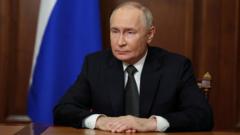In recent days, the question on many minds is "What will Vladimir Putin do next?" The Kremlin leader has set the stage for raising stakes in the ongoing conflict with Ukraine. This week marked a significant shift in rhetoric, as Putin lowered the threshold for potential nuclear weapon usage, prompting global concerns about escalation. The United States and United Kingdom further aggravated tensions by supplying Ukraine with long-range missiles, prompting Putin to issue stern warnings about retaliatory strikes against Western allies.
The Kremlin has accused the “collective West” of escalating the war, yet a closer examination reveals that it is Putin himself who often chooses escalation as a strategy. His actions—from the full-scale invasion of Ukraine to recent missile attacks on Ukrainian cities—indicate a pattern of responding aggressively to perceived threats. This has led analysts to term Putin as a leader who drives forward without hesitation.
As Western governments brace for possible Russian retaliation, the intensity of Russian military operations in Ukraine seems poised to increase. Intelligence from MI5 has already highlighted concerns related to Russian hybrid warfare aimed at destabilizing Western nations.
Discussions surrounding the potential use of nuclear weapons add further complexity to the situation. Analysts suggest that while Putin has threatened to employ nuclear arms in response to what he perceives as aggression, the substance behind these threats is unclear. Tactical nuclear weapons could emerge as a terrifying possibility, but also pose risks of apocalyptic escalation.
The upcoming political shift in the United States, with the potential for Donald Trump's return to the White House, complicates the geopolitical landscape. Trump’s skepticism toward military support for Ukraine and openness to dialogue with Russia could lead to a recalibration of the Kremlin's strategy. Thus, while the present moment is fraught with tension and imminent threats, a change in U.S. leadership may influence Putin's calculations moving forward.
Ultimately, as the world watches closely, the question remains: how will Vladimir Putin navigate this intricate web of international relations amid an intensifying war? The responses, laden with uncertainty and potential chaos, could redefine security across Europe and beyond.
The Kremlin has accused the “collective West” of escalating the war, yet a closer examination reveals that it is Putin himself who often chooses escalation as a strategy. His actions—from the full-scale invasion of Ukraine to recent missile attacks on Ukrainian cities—indicate a pattern of responding aggressively to perceived threats. This has led analysts to term Putin as a leader who drives forward without hesitation.
As Western governments brace for possible Russian retaliation, the intensity of Russian military operations in Ukraine seems poised to increase. Intelligence from MI5 has already highlighted concerns related to Russian hybrid warfare aimed at destabilizing Western nations.
Discussions surrounding the potential use of nuclear weapons add further complexity to the situation. Analysts suggest that while Putin has threatened to employ nuclear arms in response to what he perceives as aggression, the substance behind these threats is unclear. Tactical nuclear weapons could emerge as a terrifying possibility, but also pose risks of apocalyptic escalation.
The upcoming political shift in the United States, with the potential for Donald Trump's return to the White House, complicates the geopolitical landscape. Trump’s skepticism toward military support for Ukraine and openness to dialogue with Russia could lead to a recalibration of the Kremlin's strategy. Thus, while the present moment is fraught with tension and imminent threats, a change in U.S. leadership may influence Putin's calculations moving forward.
Ultimately, as the world watches closely, the question remains: how will Vladimir Putin navigate this intricate web of international relations amid an intensifying war? The responses, laden with uncertainty and potential chaos, could redefine security across Europe and beyond.




















